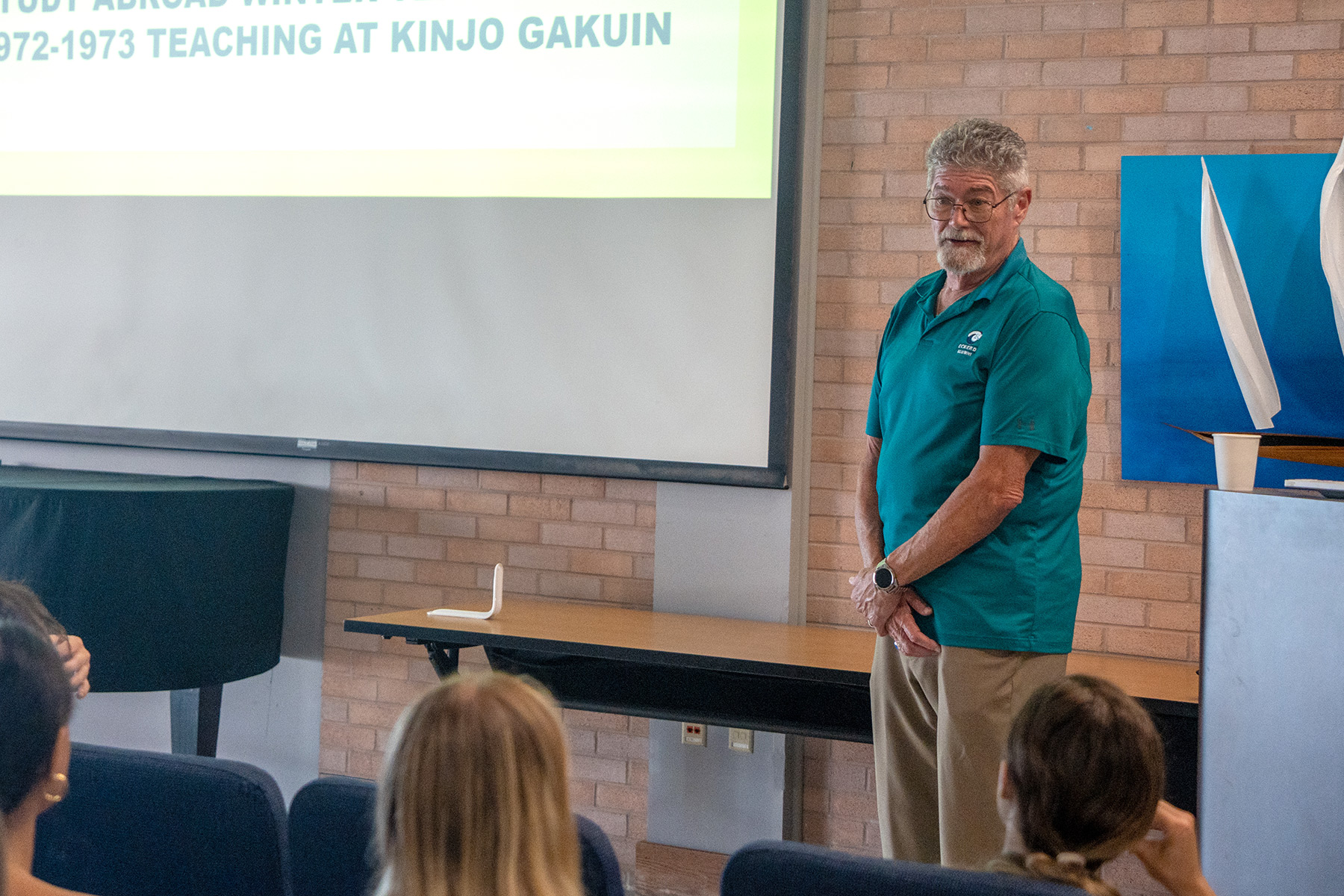Bruce Carter ’74 paid a visit to Eckerd College’s Lewis House on Mar. 7 to discuss, with human development students taking a human sexuality course, his qualitative research focused on gay and lesbian grandparents. But first, he talked about his diverse background knowledge in child development.
Carter has an impressive resume. After graduating from Eckerd with a Bachelor of Arts in psychology, he earned his master’s and Ph.D. in psychology from the University of Virginia, beginning his extensive portfolio of research. He then became an associate professor of psychology at Syracuse University, where he taught for more than 40 years and now holds emeritus status.
In 1972, in the middle of his education at Eckerd, he moved to Japan to teach English at Kinjo College. He was the first Eckerd student to teach at the institution.

“Eckerd College allowed me to design my curriculum,” Carter said. “Opportunities here allowed me to go to Japan, which had a significant impact on my life.”
He was able to take extra courses during the semester and the summer to balance his class load in Japan.
Carter also recounted memories of his comprehensive examinations, the capstone of an Eckerd education. He said the tests were more difficult than his doctorate exams and prepared him to excel in his continued education.
Over the span of his career, Carter studied many aspects of child development. Some of his research projects included the factors that influence honesty in children; he found that children are less likely to be dishonest when under supervision. When left alone, they are more likely to be dishonest, whether they went to Sunday school or not.
He has similarly studied self-control by experimenting with tedious tasks. He wanted to figure out how to keep kids engaged with a task by changing what they thought they were accomplishing.
Another major focus of his research was gender stereotypes. Carter has found that most children learn sex-typed behavior by age 6, but they often agree that “girls can do the same things as boys.” Carter’s research shows, however, that despite believing girls can, most kids react poorly when gender norms are violated.
By briefly discussing this previous research, Carter hoped to demonstrate that psychology research can be done in a variety of ways. It also was meant to clarify the path he’d taken to get to his main study: gay grandparenting.
One mode of research Carter discussed was interview data. In his study of gay grandparents, he used four fixed, nondirective questions to gather information from 16 participants—a rather large sample size for this kind of research.
He carefully explained his methods for choosing the sample: Participation in this study was completely voluntary, and all participants self-identified as either gay or lesbian. Each interview session was recorded, averaging 76 minutes, and then transcribed to text. Carter analyzed the transcription in search of recurring themes from participants’ experiences.
Most of the participants expressed that they didn’t have openly gay role models in their lives, so coming out was a developmental process. They had to learn by experience. Their ideas about a grandparent’s role were typical of results from other studies, and their queer identities didn’t change the way they viewed their own roles as grandparents. They delighted in their interactions with their grandchildren and encouraged them to be tolerant of diverse groups of people.
Gay grandparents may have different experiences than their straight peers, but their expectations of the role of grandparent and interactions with their grandchildren were similar to peers’ expectations and interactions.
No one has studied the role, experience and perception of gay grandparents before or since, he noted. Carter’s study is the only one of this nature.
“Another thing Eckerd taught me is that nobody’s opinion is better than anyone else’s as long as you have the data to back it up,” Carter said.
This is a hallmark of a liberal arts education and is a philosophy that continues to be exhibited by Eckerd College professors today.
Eckerd Assistant Professor of Human Development DeAnna Bay-Markins, Ph.D., had been a student of Carter’s at Syracuse. She had invited him to speak to her students because she wanted them to hear from someone who had gone places after Eckerd he never could have imagined while a student.
“Choosing a major doesn’t lock you into one thing,” Bay-Markins said. “With any major, there is still room for exploration.”
Carter’s diverse work is a prime example of that. His research also is an excellent complement to coursework in human sexuality.
As the clock ticked on, students remained engaged with Carter’s presentation. After his conclusion, they asked questions concerning the material and findings of his study, which made Bay-Markins proud. Guest speakers, and new perspectives, she says, bring out a new level of attentiveness from her students.













